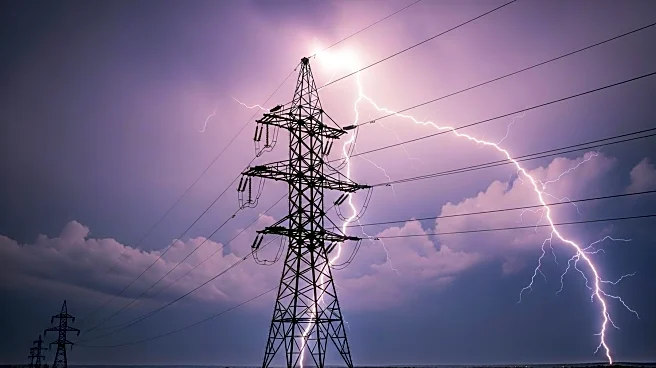What's Happening?
Russia has been accused of deliberately sabotaging the last remaining power line into the Zaporizhzhia nuclear plant in Ukraine. Satellite imagery analyzed by Greenpeace and McKenzie Intelligence Services shows no evidence of Ukrainian shelling, contradicting Russian claims that ongoing shelling is preventing repairs. The power line has been down for eight days, forcing reliance on backup diesel generators to prevent a meltdown of the plant's six reactor cores. The International Atomic Energy Agency has described the situation as unsustainable for nuclear safety. Russia is reportedly constructing a new high voltage line from Mariupol, though its connection to the plant remains unclear.
Why It's Important?
The sabotage accusation highlights the ongoing geopolitical tensions and risks associated with the conflict in Ukraine. The reliance on backup generators poses a significant risk to nuclear safety, with potential consequences for the surrounding region. The situation underscores the vulnerability of critical infrastructure in conflict zones and the potential for political manipulation of energy resources. The development may impact international diplomatic efforts and energy security policies, particularly in Europe, as countries assess the risks of nuclear safety in war-torn areas.
What's Next?
The International Atomic Energy Agency is monitoring the situation closely, with further deliveries expected to maintain generator power. The geopolitical implications may lead to increased international pressure on Russia and potential diplomatic interventions. The construction of a new power line from Mariupol could alter the dynamics of control over the plant, with Russia potentially asserting greater influence. The situation may prompt discussions on nuclear safety protocols and international cooperation to prevent similar crises.
Beyond the Headlines
The incident raises ethical questions about the use of energy infrastructure as a tool of war and the responsibilities of occupying forces in maintaining safety standards. The potential for a nuclear incident in a conflict zone could have long-term environmental and health impacts, necessitating a reevaluation of international nuclear safety agreements. The situation may also influence public opinion on nuclear energy and its role in geopolitical conflicts.










